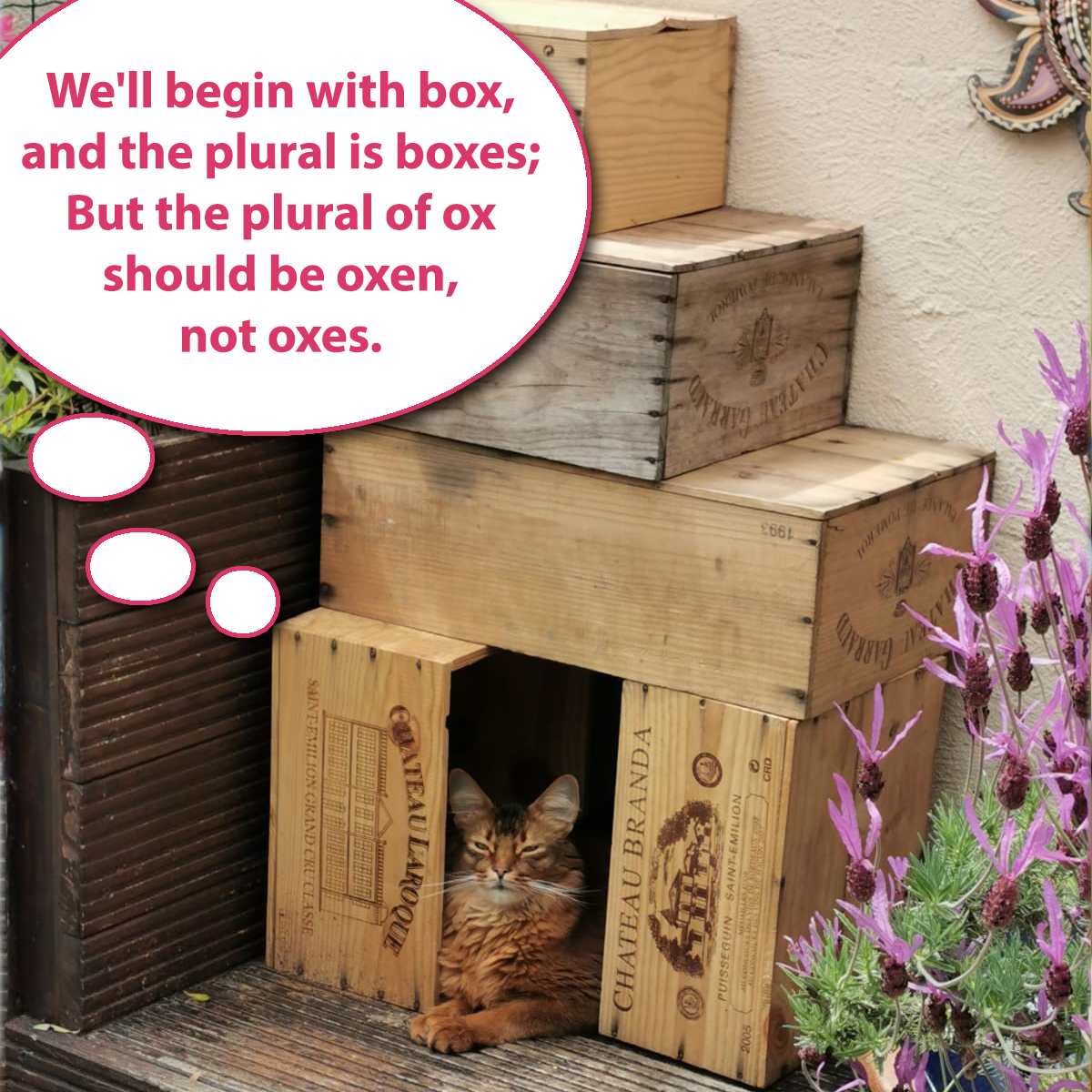Learning a language is fun and funny, but difficulties lurk when not done with honey.
English is notoriously difficult because it is very irregular in pronunciation and spelling. Thousand years of external influences amongst which the imposition of French in the middle ages and a huge importation of foreign words resulting from exploration and colonialism turned English into a mishmash. Enjoy these poems about learning English that we have gathered from various online sources.

The first of these poems about learning English dates from at least 1896!
We’ll begin with box, and the plural is boxes;
But the plural of ox should be oxen, not oxes.
Then one fowl is goose, but two are called geese,
Yet the plural of moose should never be meese.
You may find a lone mouse or a nest full of mice,
Yet the plural of house is houses, not hice.
If the plural of man is always called men,
Why shouldn’t the plural of pan be called pen?
The cow in the plural may be cows or kine,
But the plural of vow is vows, not vine.
I speak of my foot and show you my feet,
If I give you a boot, would a pair be called beet?
If one is a tooth, and a whole set are teeth,
Why shouldn’t the plural of booth be called beeth?
If the singular is this and the plural is these,
Why shouldn’t the plural of kiss be named kese?
Then one may be that, and three may be those,
Yet the plural of hat would never be hose;
We speak of a brother, and also of brethren,
But though we say mother, we never say methren.
The masculine pronouns are he, his and him,
But imagine the feminine she, shis, and shim!
So our English, I think, you all will agree,
Is the craziest language you ever did see.
Here’s more about the difficulties of plurals in another of these
about learning English
Now if mouse in the plural should be, and is, mice,
Then house in the plural, of course, should be hice,
And grouse should be grice and spouse should be spice
And by the same token should blouse become blice.And consider the goose with its plural of geese;
Then a double caboose should be called a cabeese,
And noose should be neese and moose should be meese
And if mama’s papoose should be twins, it’s papeese.Then if one thing is that, while some more is called those,
Then more than one hat, I assume, would be hose,
And gnat would be gnose and pat would be pose,
And likewise the plural of rat would be rose.
This one takes on problems of pronunciation
This is an excerpt from a very long poem by Dutch writer and schoolteacher Gerard Nolst Trenité and first appeared in his English textbook Drop Your Foreign Accent in 1920
Dearest creature in creation
Studying English pronunciation,
I will teach you in my verse
Sounds like corpse, corps, horse and worse.
I will keep you, Susy, busy,
Make your head with heat grow dizzy;
Tear in eye, your dress you’ll tear;
Queer, fair seer, hear my prayer.
Pray, console your loving poet,
Make my coat look new, dear, sew it!
Just compare heart, hear and heard,
Dies and diet, lord and word.
Sword and sward, retain and Britain
(Mind the latter how it’s written).
Made has not the sound of bade,
Say — said, pay — paid, laid but plaid.
Now I surely will not plague you
With such words as vague and ague,
But be careful how you speak,
Say: gush, bush, steak, streak, break, bleak,
Previous, precious, fuchsia, via,
Recipe, pipe, studding-sail, choir;
Woven, oven, how and low,
Script, receipt, shoe, poem, toe.
Say, expecting fraud and trickery:
Daughter, laughter and Terpsichore,
Branch, ranch, measles, topsails, aisles,
Missiles, similes, reviles.
Wholly, holly, signal, signing,
Same, examining, but mining,
Scholar, vicar, and cigar,
Solar, mica, war and far.
From “desire”: desirable — admirable from “admire”,
Lumber, plumber, bier, but brier,
Topsham, brougham, renown, but known,
Knowledge, done, lone, gone, none, tone,
One, anemone, Balmoral,
Kitchen, lichen, laundry, laurel.
Once you’ve mastered these then look at the differences between American and British English. One very dangerous expression is « to knock her up ». For a Brit that would mean to make something in a hurry for an American it means to make a woman pregnant! Be careful.
To learn more idiomatic expressions in English visit our Speak Easy puzzles and come to Bill & Rosa’s Book Room where we have a whole section about learning English.

